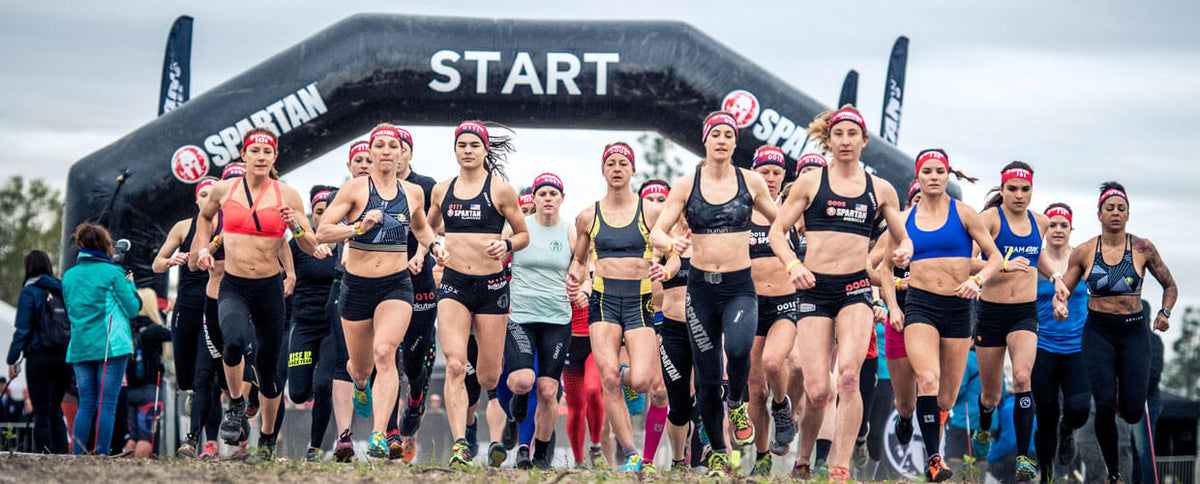4 Pro Tips to Build a Solid RD-Fuel Strategy

Sponsored by our partner, Honey Stinger
Hitting a nutrient wall mid-race is the WORST. You know exactly how this can feel: we’re talking heavy legs, nausea, headaches, dizziness, and yes, even puking your guts out (ugh).
Toeing the starting line without proper protein, sugars, carbohydrates and electrolytes already in your system, and failing to refuel on the course before your stores run out can set you way back. (Or even, sadly, take you out of the game.) The good news? With a solid race-day fuel strategy you can avoid the nutrition pitfalls that’ll keep you from crushing your PR. The key is to experiment with different ways to get nutrients (both before, and during your race), and figure out what works for you. (Think: if you feel good, it works. If not, switch it up.)
“Having a strong race-day fueling strategy can make all the difference when it comes to performance and your health,” says Corinna Coffin, MS, RD and Spartan Elite athlete. Hydration and intelligent caloric intake—focusing on carbs—is crucial. “If you’re carrying hydration, having a carbohydrate and electrolyte mix is an easy way to get in calories on the go. Consuming nutrition 30 minutes into a race may feel silly, but it’s important to fuel up before you’re hungry or thirsty. Once these signals hit, it’s usually too late to avoid bonking or hitting the wall and your performance will take a heavy blow.”
Don’t let fuel jitters hold you back. Use these nutrition pointers from Spartan Pros to get enough nutrients before, during and after your race to finish strong, and bounce back ASAP.
Related: Undernourished? Warning Signs to Watch Out For (+ Pro Tips to Fuel Up)
View this post on Instagram
Me after long runs: gimme all the waffles! ⠀ ⠀ @honeystinger #sweetentheburn
4 Race-Day Fueling Tips You Should Know Before You Go
TIP #1: DIAL IN YOUR HYDRATION
Fact: Our bodies consist of about 70% water. H2O is essential to all metabolic functions—especially when you’re working hard in endurance activity. A recent report published by Human Kinetics, found that a loss of sweat equal to 2% of an athlete’s body weight causes a noticeable decrease in physical and mental performance, and losses of 5% or more during physical activities may decrease “the capacity for work” by roughly 30%. In other words: you may become one third less effective on the race course if you’re dehydrated.
Drink Like the Pros:
Keeping your cells well hydrated before, and during the race makes a huge difference in your body’s ability to operate optimally. Spartan Pro and 4X World Champion Lindsay Webster says that as a rule of thumb, she makes sure to drink 300-500ml of water every time she intakes nutrition during a race. Sip slowly, to allow your stomach time to absorb the nutrients, and carry a hydration pack if you don’t want to stop at aid stations.
Spartan Pro and 2019 World Champion Nicole Mericle says she likes to have a glass of water first thing in the morning on race day. “Keep in mind chugging a full glass is not as good as sipping on the same amount of water slowly,” says Mericle. “Don’t start chugging water in the days before, but do make sure you are drinking enough, even if you’re tapering and therefore training a little less.”
TIP #2: BETTER YOUR BREAKFAST
Getting your breakfast right will require a little R&D on your end. “Breakfast on race day is the last big opportunity to ensure that your body’s glycogen stores (the storage form of carbohydrates) are topped off heading into the event,” says Coffin. “This meal will also provide the first source of fuel for your body heading into the race, so it’s important to choose the right foods.”
Essentially, it comes down to eating a balance of simple and complex carbs at exactly the right time. Because they’re higher in sugar, simple carbs digest and absorb much quicker than complex carbs. Complex carbs, which are higher in fiber, take longer for the body to process. “If you wake up early enough on race day to eat breakfast, a combination of both is recommended,” says Coffin. “Too many simple carbs will cause a spike in blood sugar, followed by a drop, which is not what we want before a race. On the other hand, too many complex carbs and high-fiber foods can cause GI distress and take considerable time to digest.”
It’s also important to give potential RD breakfasts a trial run, so you don’t fudge on the day. (Hint: try a different option before each long training run to simulate race day.) If you don’t know where to start, Coffin recommends oatmeal (the complex carb) with a banana and honey or maple syrup (the simple carbs), as well as a small amount of nut butter (protein) and yogurt or milk (fat).
Related: How to Fuel Up (And Recover Smart): Q&A with Spartan Pro Nicole Mericle
Brunch Like the Pros:
Okay, to be clear, we don’t mean hit the local diner. (Duh.) But jokes aside, what you put into your body before a race matters. “Between the early hour and nervous energy, I’m not always hungry, so having something on the sweet side helps,” says Mericle, who usually gets up at 5 a.m. to eat breakfast before a race. “Avoid a really fat-heavy meal and make sure to eat enough!” Mericle opts for two frozen gluten-free waffles, which she toasts, spreads with almond or sunflower seed butter, and tops with berries and maple syrup.
Webster, on the other hand, eats a rice mixture that she whips up the night before. “It may sound strange, but this was told to me by a well-respected nutritionist, and it makes me feel great!” she says. “[The rice mixture] gives you the carbs you need for fuel, plus healthy fats to burn if you run out of carbs for a longer-term fuel source, as well as sodium to replenish what you’ll be sweating out.”
TRY WEBSTER’S ENDURO-RICE MIX: Boil white basmati rice (about ¾ cup, uncooked), and mix in one tablespoon of coconut oil, one tablespoon of nut butter (her favorite is almond), and a pinch of salt.
TIP #3: DON’T WAIT TO FUEL, OR YOU MIGHT REGRET IT
Everyone metabolizes nutrients differently, but timing is key. If you wait until your body signals you that it’s thirsty or hungry, you may be SOL. “Unfortunately, we often realize the compromised position we’re in once it’s too late—when the fatigue has set in, the muscle cramps or spasms start, and we don’t have the strength left to do the things we know we’re capable of,” says Coffin.
You can circumvent this frustration if you stay on top of it. During a race, Coffin recommends eating around 30-60 grams of carbs per hour. And if you’re new to OCR, she says a general rule of thumb is to aim for 25 grams of carbs every half hour. “These types of carbohydrates can range from liquid to solid options depending on personal preference, hydration needs and gut comfort,” says Coffin. Her favorite go-to for the course? “Honey Stinger energy gels and chews contain between 20 and 30 grams of carbs, which make things easier.”
Refuel Like the Pros:
Mericle says she takes an energy gel about 45-60 minutes into the race. She continues popping them about every 30-45 minutes from there, based on how she’s feeling. “Don’t wait to fuel. Be proactive,” she says. “Have a plan.”
For shorter races (five hours or less), Webster reaches for natural sources of fast carbs, like Honey Stingers or pure maple syrup, as well as electrolyte drink mix to add to her H2O. During longer races, she also eats her rice mixture to help bolster her energy stores. Nutrition is tricky because athletes react so differently to various fuel sources. “I knew a man who would run 24-hour races just by eating around 48 gels,” says Webster. “If I did that, my stomach would surely rebel. On the flip side, some people find that a shot of maple syrup doesn’t give them enough of an energy boost.” Experiment with on-the-go fuel in your training, see what works best for you, and aim to take in around 200 calories per hour during your race.
TIP #4: RECOVER, CELEBRATE (+ TAKE NOTES)
Listen, you might not get your nutrition perfect right off the bat. Most athletes don’t. It takes a lot of mileage, and many races to figure out the perfect cocktail of gels, waffles, water, and sodium to perform at your best. The key is to evaluate what did or didn’t feel right, and make adjustments. “I think you learn more from the bad races than you do from the good ones,” says Webster, who “bonked really hard” during the 2016 Spartan World Championships when she underestimated her nutrition. “That was devastating, because I’d spent all year building up to and focused on that one race, and then I messed it all up so easily by forgetting to take a gel.” But she says, without a doubt, experience has made her wiser.
So we’re here to say: cut yourself some slack. No matter how your race went, learn from it—and improve your nutrition strategy for next time.
Recover Like the Pros:
“After a race, I like to have a bunch of snacks ready,” says Mericle. “I eat simple sugary snacks like fruit snacks, Honey Stinger energy gels or waffles, a banana, and an energy bar of some kind.” (Always followed up by a meal shortly afterward, too.)
If Webster needs a supercharger boost of energy, she opts for Honey Stinger energy chews. “My ultimate favorite for snacking is the Cherry Blossom, please!” And after she’s bagged the finish, she makes sure to let loose—at least for the night. “After a race, I know I should eat healthy things to aid recovery, but I’ll be honest… this is time for me to celebrate the hard work I just put in, so I’ll usually go out with friends and eat whatever I feel like,” she says. “Plus drink a beer!”




